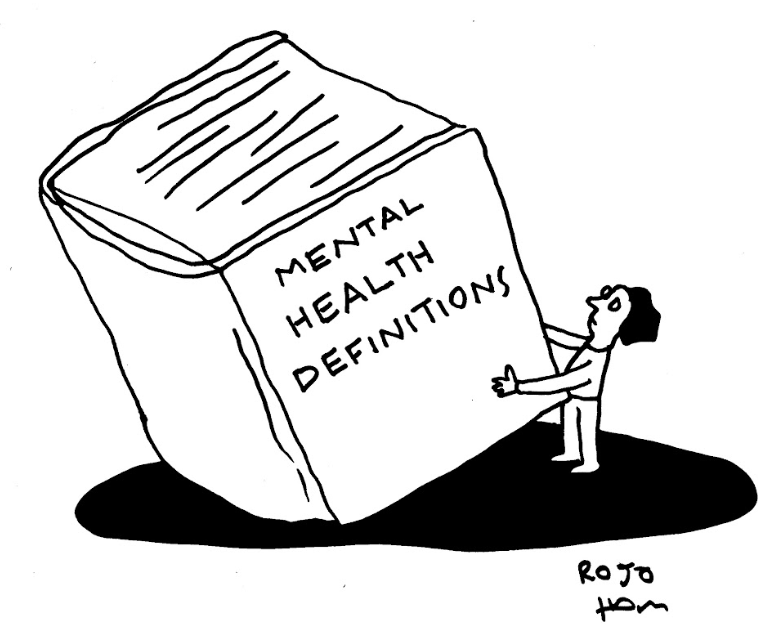Background Context
Background Context: Climate change, mental health and the need for transdisciplinary research
For definitions of all key terms used in this agenda, see the glossary. Further elaboration on the background to Connecting Climate Minds, mental health, climate change, and predicted climate hazards from a Red Cross Red Crescent Climate Centre analysis is available in Appendix 2.
Conceptualising Mental Health

Understandings of mental health span disciplines and cultures in complex and wide-ranging ways. For the purpose of this agenda, we define the scope of relevant terms as follows.
By mental health challenges, we mean thoughts, feelings, and behaviours that affect a person's ability to function in one or more areas of life and involve significant levels of psychological distress. This includes, but is not limited to, anxiety, depression, post-traumatic stress, psychosis, suicidal thoughts, and substance misuse.
This agenda also encourages centring the understandings and expressions of mental health or illness that are relevant to each culture and context when applying the agenda. For instance, Indigenous communities often include emotional, spiritual, social and cultural health as indivisible from and core tenets of the concept of mental health33,34.
Conceptualising Climate Change
By experiences of the effects of climate change, we mean: 1) directly experiencing the impact of climate hazards, such as more frequent and intense heat waves, wildfires/bushfires, drought, floods, or storms (e.g., typhoons, hurricanes, cyclones), and 2) experiencing climate change-related disruption to the social and environmental determinants of good mental health, such as being forced to move home, not being able to access food or water, losing livelihood or homelands, or disruption to cultural practices.
Contextualising transdisciplinary and systems-thinking approaches drawing on diverse expertise
The climate crisis amplifies existing challenges in understanding, conceptualising, measuring and responding to mental health. The climate change and mental health nexus intersects with and compounds other drivers of poor mental health (such as inequality, colonialism, extractivism, conflict, food insecurity, trauma and poor physical health). Many of the risks to mental health posed by the climate crisis, and the corresponding solutions, are not novel. For example, the mental health risk of exposure to a potentially traumatic event like experiencing a wildfire, or the value of community-based and led mental health support. Many conclusions of this agenda are shared with disciplines that tackle other mental health stressors or complex societal issues which require transdisciplinary responses. The climate and mental health field can learn from progress elsewhere. Climate and mental health research must sit within the broader context of a "polycrisis" that may affect mental health through cumulative stressors, using a systems thinking lens and a truly transdisciplinary approach35. Systems thinking has been described as an approach that helps us understand complex problems by looking at the big picture and recognizing the interconnections among the various components of the system. It involves understanding the system's structure, the relationships among its parts, and the dynamics of how it behaves over time. It seeks to identify the root causes of problems and address them in a holistic way35,36,37.
Building on this approach, all climate and mental health research should consider:s
- What is unique about the climate crisis as a driver of poor mental health outcomes, versus how climate change exacerbates existing mental health risks and trends?
- What existing climate and mental health knowledge needs to be amplified or adapted? For example, research exists on the impacts of extreme weather and climate events on mental health, though mostly in the Global North26,38. Academic evidence is lacking in the Global South where different contexts, understandings, experiences and responses around climate and mental health must be considered.
- What existing knowledge is held in other research fields, and what are the remaining research gaps in these fields that are needed to inform climate and mental health work?
- Charlson F, Ali S, Benmarhnia T, Pearl M, Massazza A, Augustinavicius J, Scott JG. Climate Change and Mental Health: A Scoping Review. International journal of environmental research and public health. 2021;18(9), 4486. https://doi.org/10.3390/ijerph18094486
- Gee G, Dudgeon P, Schultz C, Hart A, Kelly K. Aboriginal and Torres Strait Islander Social and Emotional Wellbeing. In: Dudgeon P, Milroy H, Walker R, editors. Working Together: Aboriginal and Torres Strait Islander Mental Health and Wellbeing Principles and Practice. Commonwealth Government of Australia, Canberra; 2014. p. 55–8.
- World Health Organization. Frequently asked questions on the health and rights of Indigenous Peoples. World Health Organization. Available here [Accessed 19.07.2024]
- Berry HL, Waite TD, Dear KBG, Capon AG, Murray V. The case for systems thinking about climate change and mental health. Nat Clim Change. 2018;8:282. doi.org/10.1038/s41558-018-0102-4
- Ackoff RL. Towards a System of Systems Concepts. Manag Sci. 1971;17:661–71.
- Nature-Based Infrastructure Global Resource Centre. What is systems thinking? International Institute for Sustainable Development. Available here. [Accessed 19.07.2024]
- Goldmann E, Galea S. Mental health consequences of disasters. Annual review of public health. 2014;35, 169–183. https://doi.org/10.1146/annurev-publhealth-032013-182435